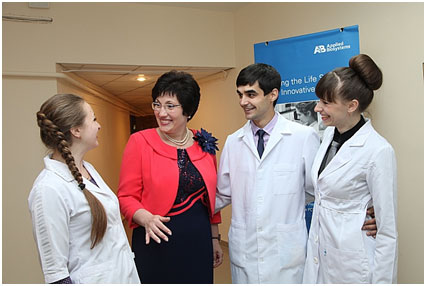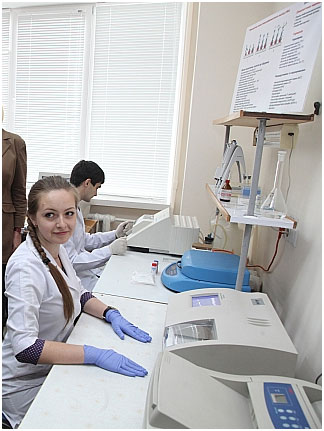ECM RESEARCH INSTITUTE – AS A METHODOLOGICAL BASIS FOR EDUCATION OF STUDENTS AND CADETS OF THE INSTITUTE OF POSTGRADUATE EDUCATION
Since 2015 for students of 5 and 6 years is offered at the Department of Bioorganic and Biological Chemistry an elective course “Clinical Biochemistry and Laboratory Diagnostics”


PURPOSE AND TASKS OF THE COURSE
Goal:
mastering the principles and skills of rational use of laboratory algorithms in various forms of pathology, the formation of students’ stable skills in applying methods of laboratory diagnostics in the treatment and diagnostic process, the ability to interpret laboratory results based on a holistic view of physiological processes in the body.
Task:
- Getting acquainted of students with possibilities of modern laboratory methods of researches taking into account sensitivity, specificity, admissible variation of methods;
- study of indications and contraindications to laboratory tests;
- teaching of skills of drawing up a plan of laboratory examination;
- study of clinical interpretation of laboratory examination results;
- analysis of possible causes of false positive results, distortions, associated with the consequences of pharmacotherapy and improper preparation of the patient for the study (providing pre-analytical stage);
- acquaintance with the problem of standardization of laboratory researches.
As a result of studying the discipline the student must
- Have a clue of the real contribution of laboratory information in the results of patients’ treatment about the diagnostic sensitivity and specificity of laboratory information in the examination and treatment of patients; monitoring, screening, dispensary examination, diagnostic complex.
- Know:
- modern diagnostic capabilities of laboratory tests
- features of the preanalytical stage of laboratory researches
- principles of laboratory research methods
- principles of patients’ preparation for laboratory examination,
- causes of errors in laboratory diagnostics
- rules for obtaining samples of blood, urine, synovial fluid, protein-free serum filtrate
- rules of storage and transportation of samples for research in the laboratory
- theoretical principles of interpretation of the obtained results
- composition of complexes of laboratory indicators in diseases of the main systems of the body.
- Be able to interpret the results of laboratory tests to different nosological forms, to build diagnostic algorithms for laboratory tests,
- Master the skills:
- development of diagnostic algorithms for laboratory research in diseases of major organs and systems
- obtaining and preparing biological material for research
- determination of the chemical composition of urine blood by diagnostic tests “dry chemistry”
- interpretation of indicators of hematological, general clinical, biochemical, immunological researches



